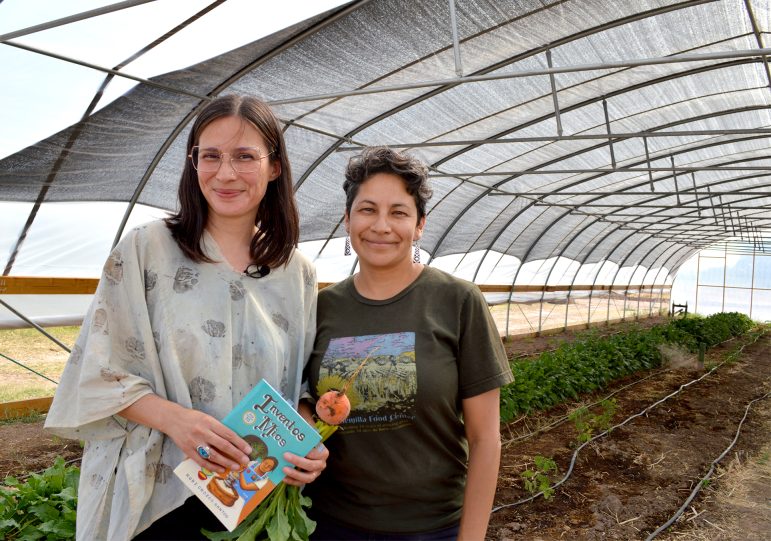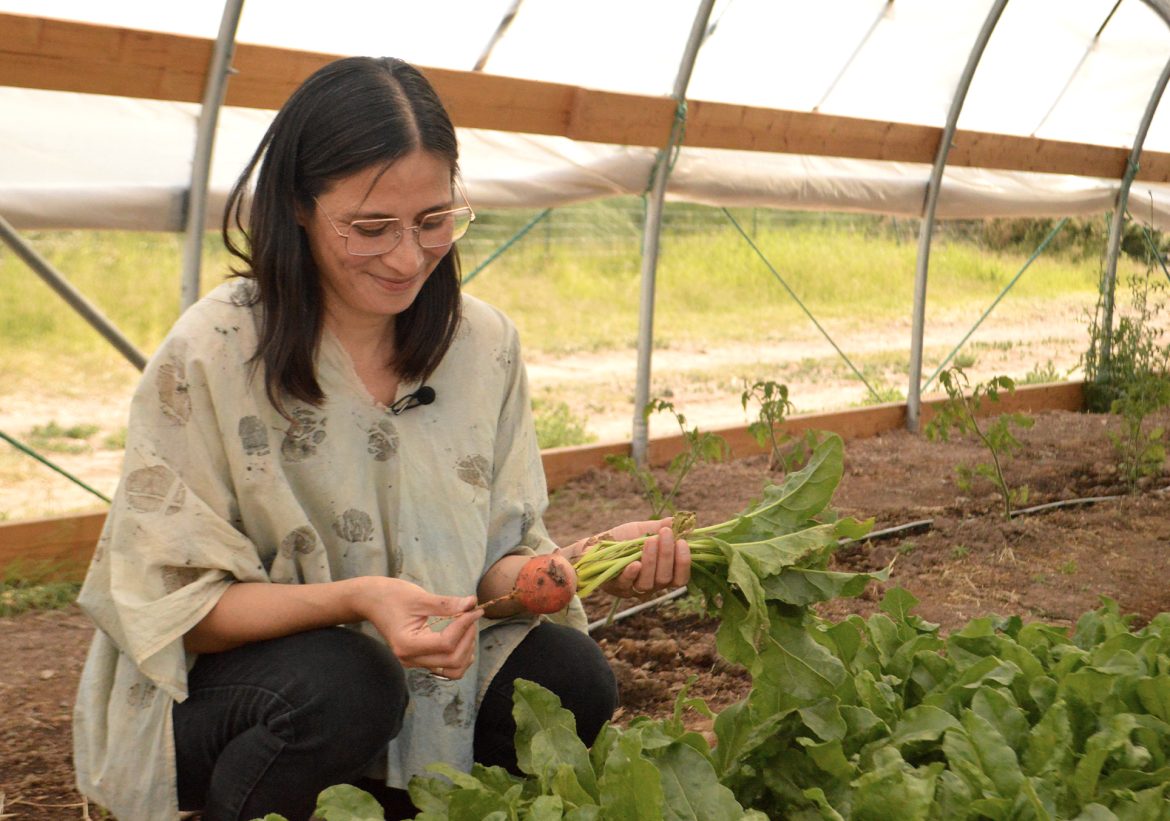By Dorothy Bland, Rachele Kanigel and Vinicio Sinta
El Paso — Artists, farmers and social justice activists are revitalizing old traditions and finding ways to create sustainable food systems for communities in the Paso del Norte region of southern New Mexico and El Paso, Texas.
Since its founding in 2010, the non-profit La Semilla Food Center in Anthony, New Mexico, has been creating a vibrant food system that prioritizes community connections, equitable economic practices and environmental health over profits.
A poster in La Semilla’s main office reads: “Food sovereignty = livelihood + self-determination.” La Semilla’s farm also has two colorful box car murals that celebrate the beauty of corn, beans and other foods produced in the area.
Each week, the mostly female and non-binary staff assemble 40 to 80 produce boxes, packing them with fresh seasonal produce grown at its 14-acre demonstration farm and other small farms in the region, said Jeanette Ramirez, co-manager of the center’s Farm Fresh program. The “food hub” also provides community and youth education programs that teach kids and adults how to grow and cook fresh food.
The food boxes, which come with recipes, allow community members to eat with the seasons and learn about foods they may not be familiar with.
“Right now we’re about to enter cherry season,” said Ramirez. “We have a lot of turnips, we have some greens, like Swiss chard, potatoes, garlic, chives and carrots.”
La Semilla also supports local farmers through training and fellowship opportunities while its Policy and Community Development Program advocates for policies that address the root causes of hunger and inequitable food access while creating local economic opportunities.
Yvonne Diaz, founder of De Colores Farms and Food in Anthony, New Mexico, started as a trainee and now trains and mentors other farmers and agricultural interns. Diaz said she was inspired to join the food sovereignty movement after she learned how to grow vegetables year round and work with small farmers.
Diaz, who has a master’s degree in ag science, said she sees farming as both medicine and art. The manner in which much of the nation is “growing food isn’t very healthy for the environment, for the end consumer and especially the workers that are working under commercial food systems,” she said.
Diaz also has helped La Semilla distribute food through local school districts as well as federal WIC (Women Infants, Children) and SNAP (Supplemental Nutrition Assistance Program).
Rubí Orozco Santos, a poet and writer who earned a master’s degree in public health, serves as La Semilla’s director of storytelling and development. In that role, they work to understand and practice traditional Mexican heritage foodways and share that knowledge with the community through blog posts, workbooks, reports and zines.
“All of these practices connect us to the land and remind us we’re part of the ecosystem, and that we have wisdom in our families that kept our ancestors alive for thousands of years,” Orozco Santos said. “We see storytelling narrative work uplifting this inherently healthy, beautiful heritage and food traditions and encouraging their practice.”
In the zine titled “Food, Land, and Us: A Look at the Farm Bill from the Paso del Norte Region,” La Semilla tells the political history of food production in the region in a graphic novel style. The zine, which is available in English and Spanish, has been used by teachers and food activists around the country.
Orozco Santos’ documentary poetry book, Inventos Míos, is inspired by the history and current practice of nixtamalization, a traditional maize preparation process in which dried kernels are soaked and simmered for hours in an alkaline solution, usually water and food-grade lime (calcium hydroxide).
The maize is then milled to produce masa, a dough used to make tortillas, tamales and other traditional maize foods. Practiced for centuries by people across Mexico and Central America, the nixtamalization process changes the structure and chemical composition of the corn kernels, making it more pliable and more nutritious.
Celsa Ibarra, a resident of northeastern El Paso, is one such user of traditional maize processing techniques and Orozco Santos features her in a poem in Inventos Míos. Most years, Ibarra travels to Guanacevi, in the Mexican state of Durango, for the Feast of the Immaculate Conception in early December, and returns with a costal of white corn cultivated in the area. Her family then spends the days leading to Christmas making masa and tamales out of this corn.
Growing up on farmland in the small town of Zape Chico, about a half-hour from Guanacevi, Ibarra learned the process of nixtamalization from her mother. She and her 10 siblings helped their parents grow and cook meals using food from their parcela – not just the white heirloom corn, but also chilies, beans and other staple foods from northwestern Mexican cuisine.
Orozco Santos said it’s vital for borderland communities to understand ancestral food traditions and embrace practices that reclaim the land and heritage foods such as amaranth.
Though often called an “ancient grain,” amaranth is technically not a grain but a member of the botanical family that includes beets, chard and spinach. Amaranth was a staple of the Mesoamerican diet for centuries and also used in spiritual rituals. Fearful that this important plant could interfere with systemic conversion of Indigenous people to Catholicism, Spanish invaders banned its cultivation and consumption, and the plant nearly disappeared.
Now Orozco Santos is among those trying to educate people about its history, cultural significance and impressive nutritional properties.
Orozco Santos said in her 15-plus years working at the community level she has come to understand “food as part of identity, a part of who we are, a part of what connects us to our ancestors and to each other and to future generations.”

Rachele Kanigel
Rubí Orozco Santos, director of storytelling and development of La Semilla Food Center, and Executive Director Cristina Dominguez are leaders in the food justice movement in the Paso del Norte region. Photo by Rachele Kanigel/Borderzine.com
This story was produced as part of the 2023 Dow Jones News Fund Multimedia Training Academy hosted at UT El Paso. The academy trains college and university journalism professors from Hispanic-serving institutions and Historically Black Colleges and Universities in media creation and editing to help them prepare their students for multimedia career opportunities.


